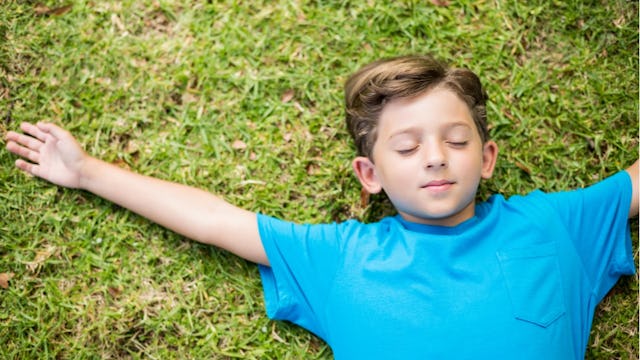Fainting Is Freaking Terrifying. Here's What You Need To Know.

If you’ve ever had a child faint while in your care, you probably know that it is pretty much the most fucking terrifying experience ever.
When my son was two-and-a-half, he passed out for about five full minutes while taking a bath (and yes, this is another reason to always, always supervise your kids while they bathe). It was a hot summer day, and after filling the bath, I realized that I’d made the water too hot. A few seconds after, I added some cold water to the bath, at which time my son proceeded to turn ghost-white, lose all color in his lips, and fall limp into my arms.
Holy shit, right?
I did exactly what you are not supposed to do in situations like this: I freaked the fuck out. I should have checked his vital signs, but instead, I flew into a raging panic, feeling certain that he was dying, or already dead. I called 911 in the midst of my full-blown freak-out, and the operator had to remind me to remain calm so I wouldn’t scare my son.
Luckily, by the time the paramedics arrived, my son was starting to come to, and although I was still completely emotionally traumatized, I knew he was going to be OK. We took him to the hospital after that, where he got a full health scan, and was diagnosed with a “vasovagal syncope” episode — most commonly knew as fainting — that was probably brought on by a sudden drop change in blood pressure that happened when I changed the bath water from hot to cold.
After chastising myself for being an awful mother because I had given him a hot bath in the middle of summer, we all came out of the experience relatively unscathed—which seems to be the case for the majority of young children who faint. THANK GAWD.
“In the majority of cases, fainting is not a sign of a dangerous medical condition,” says the Children’s Hospital of Philadelphia. It happens when the brain doesn’t get adequate blood pressure, and fainting is the body’s way of compensating for this until your blood pressure returns to normal, says the hospital.
This is good to know, of course, but while you’re dealing with an unconscious kid—especially if it’s your first time—it doesn’t feel at all like a non-emergency.
And yet, medical professionals take this kind of thing in stride, at least in most cases. In fact, as the Children’s Hospital of Philadelphia points out, the vast majority of fainting episodes in kids happen when they are dehydrated, and the Captain Obvious answer is to keep them hydrated.
“When the body doesn’t get enough fluid intake, the blood pressure can drop, which can cause inadequate blood flow to the brain,” says the Children’s Hospital of Philadelphia. “In many cases, as a first step, pediatricians will recommend that children who have fainted simply drink more. They may also recommend increased salt intake, not skipping meals, and eliminating caffeine. Often this will ‘cure’ the problem.”
Besides dehydration, the hospital mentions fear, pain, hot or crowded environments, hot showers (or baths, in my experience) as common causes of fainting. Additionally, certain medications or drugs can cause fainting as a side effect. Fun times, I tell you.
Of course, there are some cases where fainting can be an indicator of a more serious medical condition, and doctors recommend your child go in a for a full medical work-up if they faint to rule out other more serious causes.
“It’s important to talk to your pediatrician about your child’s fainting and not gloss over it,” says Dr. Jennifer Silva, a Washington University pediatric electrophysiologist at St. Louis Children’s Hospital. “Pediatricians are good at sorting out what’s serious and what’s not, and they know when to refer children to a specialist if needed. If fainting starts to happen very frequently, there are things we can do to help.”
Given that fainting can be so freaking scary — I know I can’t be the only one who has almost shit their pants upon seeing their child turn sheet-white and pass out — most parents probably get the situation checked out pronto. But if your child has fainted before (or more than once) and you’re hesitating about whether to go to the doctor, here’s your wake-up call to do so.
Most of the assessments that are done to your child will be pretty easy and non-invasive. According to the St. Louis Children’s hospital’s website, these tests might include an EKG, an exercise stress test, heart monitoring, and possibly an MRI of the brain. (My son did not need an MRI, but your doctor will decide what tests are best for your child on an individual basis.)
Interestingly, according to the Academy of American Pediatrics, it turns out that the tendency to faint is often genetic—and this is definitely true in my family, as my mother and I are prone to dizziness, lightheadedness, and fainting.
And word to the wise: if you have a child who has fainted once, be prepared for other possible scares.
Although my son has never fully fainted again, he has almost passed out a couple of times, like when his blood was drawn, and a couple of times when he has been overheated or dehydrated. He is also sensitive to hot temperatures and gets easily nauseous/dizzy when his environment heated or stuffy. He takes after his mama in that regard as well.
Most of all, if you ever are in a situation with a fainting child, try to remain calm (though I understand it’s nearly impossible), and know that most likely your child will be totally fine, and one day it will just make a very entertaining—albeit slightly horrifying—story to remember.
This article was originally published on